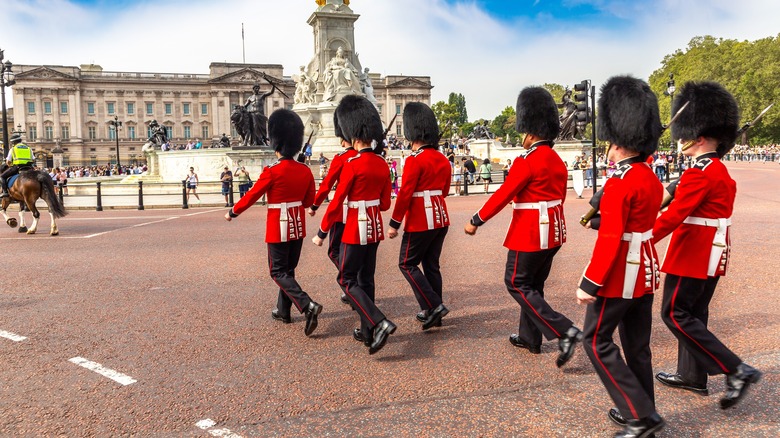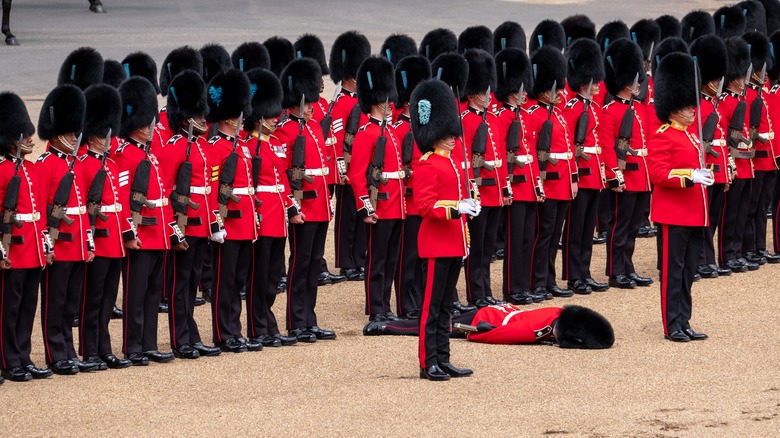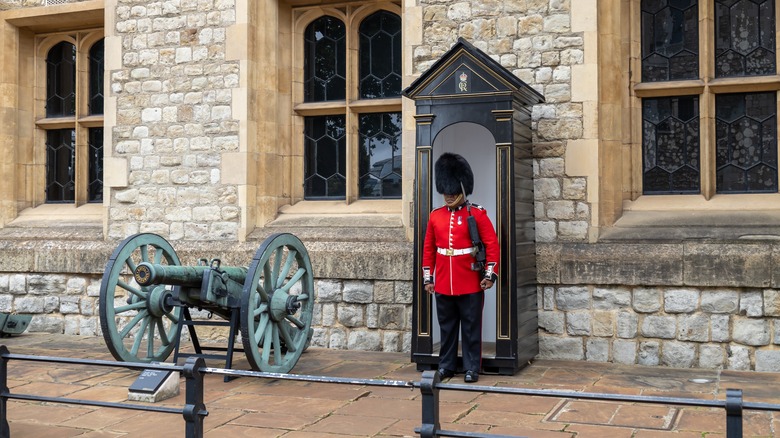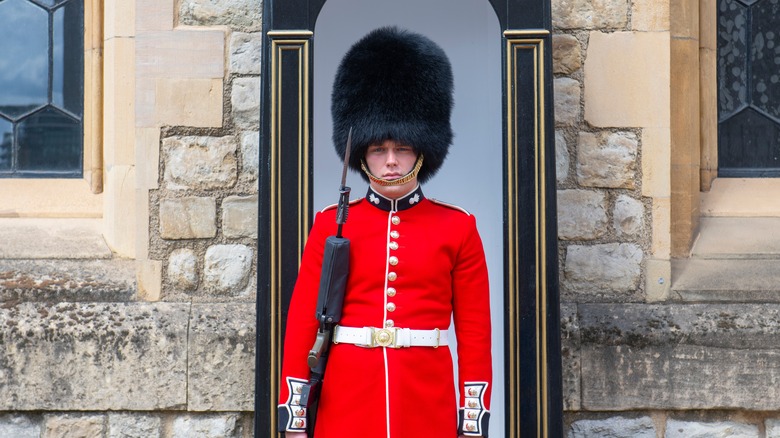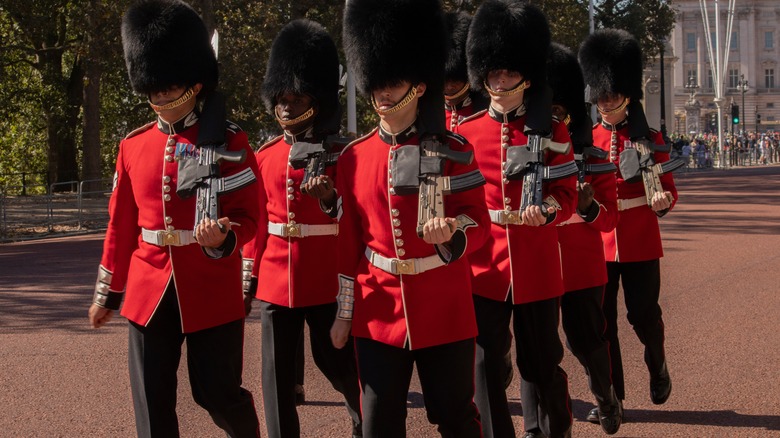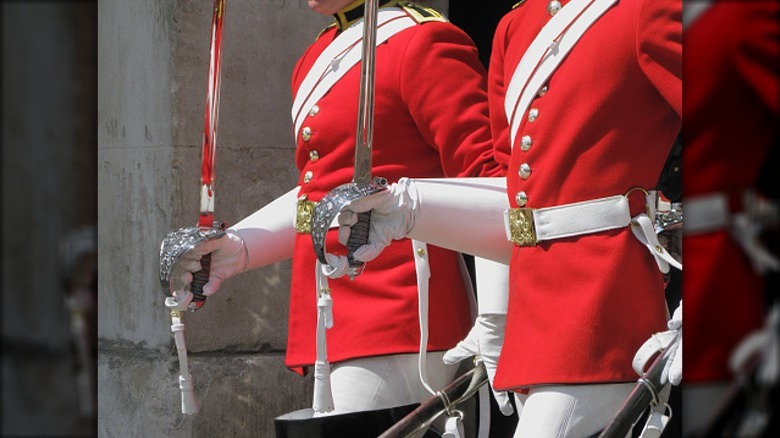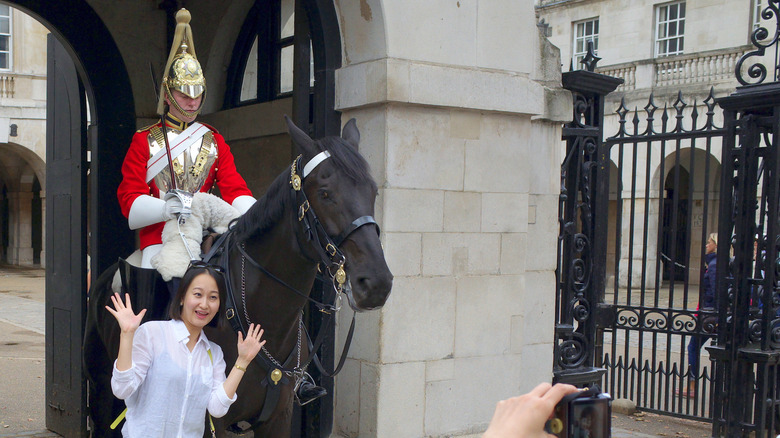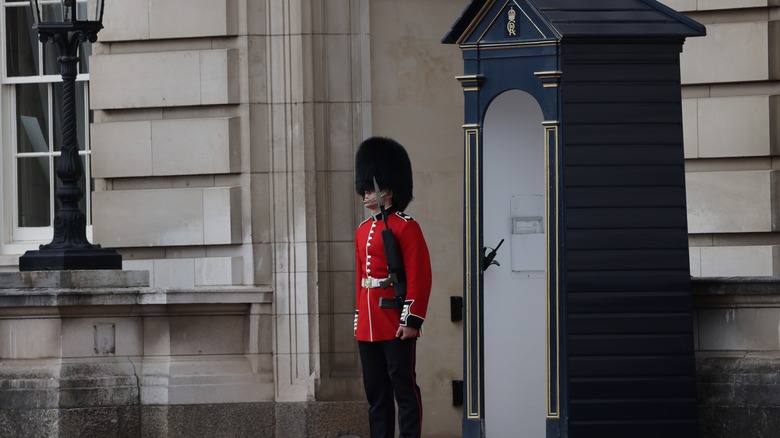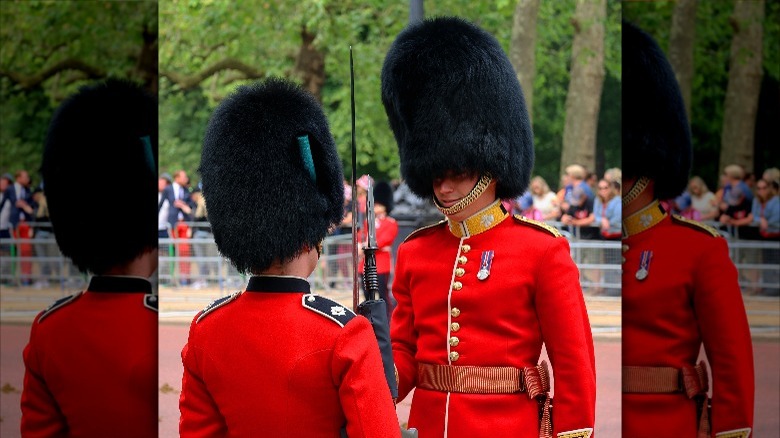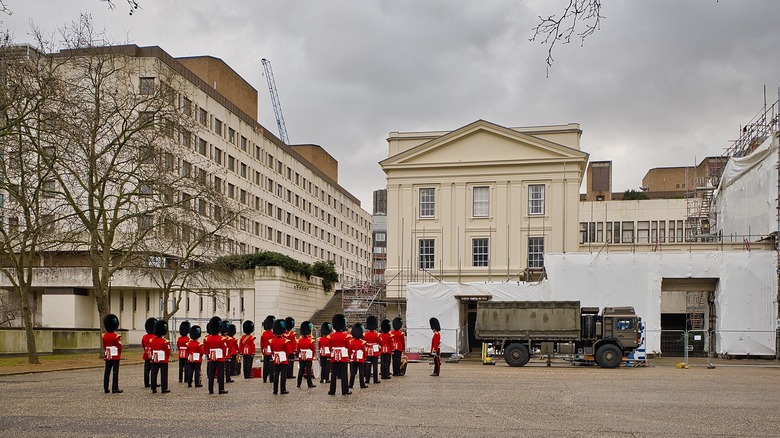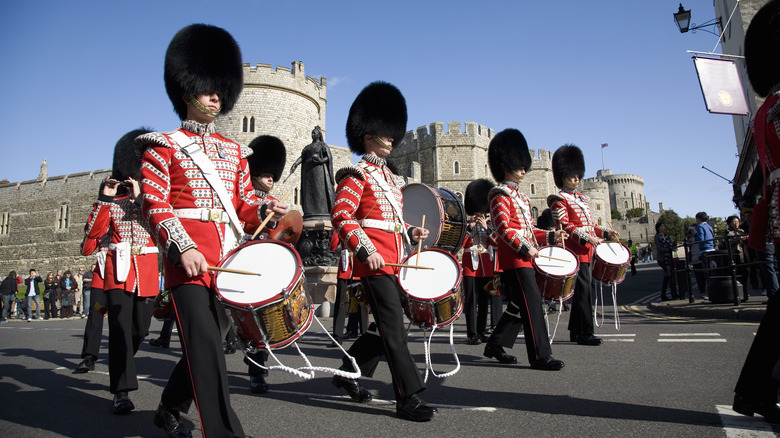Weird Rules British Military Guards Must Follow
The British military guard is a group that probably needs very little introduction. There's no doubt you've seen them before: the red-clad soldiers with the tall, fluffy black hats who stand outside of royal residences and refuse to smile, even as tourists wander up to them for selfies and the like. Whether you've been to London or not, there's no doubt you've seen these soldiers, their iconic uniforms, and their even more iconic, stoic demeanors. They're so well known that plenty of visitors more or less think of them as tourist attractions in their own right.
That said, they're just people who are trying to do their jobs, and bona fide soldiers, too. As such, they have quite a few rules that they're expected to follow. At the same time, though, given just how unique their position is, some of those rules are definitely a little weird, probably accounting in some way for the reason why so many tourists are absolutely fascinated by them. Here are a handful of those strange and unique rules.
Guards have to faint to attention
London may not be known for having exceptionally hot weather, but that doesn't mean it can't get more than a little warm. As such, it's not exactly an uncommon occurrence for guards to faint on the job, but the weird thing is that there's actually a proper protocol the British military guards follow when fainting.
Explicitly, they're told that they're supposed to faint "to attention"; in other words, they're expected to fall straight forward, directly onto their faces, without buckling at the knees, listing off to the side, or catching themselves on their hands. Not only that, but if they're holding something — like their rifle — then they need to make sure they don't drop it before they hit the floor themselves. (Hence the images you might have seen of guards lying face down, unconscious on the pavement.) And it's far from a pleasant experience, with Major Dai Bevan explaining, "It will probably involve a broken nose and a whole lot of missing teeth" (via Express).
The guards are given tips on how to avoid fainting, like drinking plenty of water or loosening the bands on their hats, but sometimes it can't be helped. In June 2023, during a recorded parade rehearsal in the middle of a heatwave, multiple guards — at least four of them — fainted, their instruments still held to their lips as they fell, before being carried off the field on stretchers by a waiting medical team.
They're not allowed to go to the bathroom
The typical image that most people probably have of British military guards is of stoic soldiers standing completely still in front of the royal residences across England. That's far from an inaccurate image, though it can start to raise some strange questions about what exactly a day looks like for those soldiers. For example: Can they go to the bathroom?
The short answer is no. The guards serve in two-hour shifts, and during that time, they aren't allowed to leave their posts at all; there are no exceptions to that. Not even to go to the bathroom. This same rule also carries over to every formal event that the guards take part in, though, some of which are considerably longer than those two hours, and which may feature some factors that make the bathroom rule quite a bit less comfortable. Parades or royal weddings are two such occasions, given that the latter can last some four hours, and the former typically requires that the guards have had plenty to drink beforehand. That's not exactly the best combination of circumstances, and Guardsman Bryce Pounder has said, "You can hear lads groaning behind you" (via Express). Sometimes, it goes past mere discomfort, and Guardsman Shaun Marsden has even admitted, "You might get a few little puddles." Fortunately, their dark pants hide things like that pretty well, should it ever come to that.
They're not allowed to smile
British military guards are renowned for their stoic demeanor. No matter how many tourists approach them to take photos and selfies — or tell jokes to bother them — they'll typically find that it's a nearly impossible task to force a smile from them. And that's because it's actually one of the rules followed by the royal guards. They actually aren't allowed to smile or laugh, no matter what situation they're met with. It's all a matter of professionalism.
And because this is a rule, it only follows that there's some sort of punishment for breaking it, but strangely enough, there are somewhat conflicting reports on this matter. Most commonly, you'll hear that there's some sort of financial punishment, with exact ranges differing from a couple days worth of pay to a couple of weeks. If you're looking for an exact number, that's somewhere around $350 or so, just for cracking a smile. That said, other sources have said that there's no real truth to this rumor, and that while none of their superiors will be particularly happy with them, a soldier who lets a smile slip doesn't have to give up any of their paycheck.
Alternatively, one soldier has suggested that laughing has an even steeper punishment: "There would be a re-education at a military prison in Colchester to make sure they're still aware of their responsibilities when they're on post" (via TimeOut).
Their hats are a requirement with a lot of history
When you think of the British military guards, the iconic fluffy black hats that they wear, obscuring a not insignificant amount of their faces, are probably what first comes to mind. Naturally, that's a required part of their uniform, but it's also a requirement that has a lot of history to it. And quite a bit of controversy.
Historically, the bearskin hats date back to the Napoleonic wars and were actually a staple of both British and French military garb, used as a fashion-based intimidation tactic. They made the soldiers appear taller — and thus more threatening to their enemies — and they also became a symbol of honor, with British soldiers taking the hats of their French counterparts when they claimed victory at the Battle of Waterloo, so the explanation goes..
Presently, though, they've come under fire. As the name suggests, bearskin hats are made of the actual pelts of black bears, most of which are killed in Canada. According to one soldier, it takes at least one full bear pelt to make a single hat, and the claims that those pelts were sourced from necessary culling programs are actually lies. Rather, recreational hunters kill the bears, often in gruesome and painful fashions. And despite the existence of plenty of faux furs, the Ministry of Defense has claimed that none of them quite suit their purposes for one reason or another, meaning that military guards will probably need to keep wearing real bearskins for the time being.
Guards have a strict maintenance routine for their uniforms
Given that the British military guards have their reasons to wear real bearskins, it follows that the soldiers would be expected to take good care of them. After all, despite the environmental concerns surrounding them, many soldiers still wear them with immense pride, and the British government typically likes to keep them in circulation for as long as possible. In the first few years of the early 2000s, they did buy about 500 new bearskin hats, but even more than that were refurbished and reused.
As such, guards are told to follow a pretty strange routine when it comes to keeping their bearskins in top shape. One soldier explained that the fur of the hats is actually remarkably similar to human hair, so upkeep and maintenance are effectively the same; in other words, they're told to carefully shampoo them with mild soap and leave them out to air dry. Another account even specifies that, prior to big events like royal weddings, the soldiers are even expected to shower with the hats in order to shampoo them and then (just like with human hair) comb out the fur the next morning.
Of course, they can't be lax about the rest of their uniform, either. Prestigious enough events can warrant new pairs of boots, which the guards have to wax until the surface shines like a mirror — a process that can take at least three days and up to five whole tins of polish.
Guards are allowed to talk (sometimes)
As always, the British military guards are known for their stoicism and silence, which always makes it rather surprising whenever one of them actually responds to a tourist's actions in some way. And while their strict adherence to professionalism means that they definitely won't be smiling or laughing at someone's jokes, that doesn't mean that they aren't given specific allowances to speak.
Generally speaking, they're allowed to break their code of silence when tourists get involved. Sometimes, that just involves shouting out "Make way!" while they're marching, in order to make sure that no one is standing in their path. But in more extreme circumstances, such as if a tourist tries to make physical contact with them, they're allowed to yell at the intruder to scare them off, and in worst-case scenarios they're even allowed to raise their bayonet-tipped weapons to them, just to make sure they get their point across. In one case, a tourist tried to touch the reins of one of the guard's horses, only for the soldier to yell and seemingly shock her (though she proceeded to try again, met shortly after with an even harsher reprimand).
All that said, sometimes they will also speak up for reasons other than warnings and reprimands. A guard told TimeOut that some tourists are actually very considerate and will ask if it's alright before taking photos. On one occasion, he recalled, "One American tourist ... asked if she could give me a peck on the cheek. I had to say 'absolutely not.'"
They aren't supposed to move at all
The British military guards aren't supposed to react to anything around them that is not a threat. Save specific circumstances where they might have to warn off obnoxious tourists, their protocol dictates that they're not supposed to show any responses to the world around them. That even includes moving; while on duty, they are, in fact, expected to stand as still as statues.
It should be said, though, that there are definite exceptions to this rule; after all, standing stock still for a full two hours is literally bad for anyone's health. (It's a pretty reliable way to end up passing out, in fact.) Due to that, the soldiers are only mandated to stand still for 10-minute intervals at the very least. After that amount of time passes, they're allowed to go for a quick march up and down the street, keeping their blood flowing and stretching out their muscles.
Similarly, on days when it's especially hot out, they're allowed to break their statuesque stance and prioritize hydration. Guards have been seen taking teacups full of water to their peers, and on one occasion, a police officer was observed holding a water bottle to the lips of a guard (who, to be fair, still maintained his ramrod-straight posture and kept his weapon properly upright in his arms).
Guards have a very specific dress code
Every element of the British royal guards uniform is iconic, to say the least. Most everyone can probably recognize that particular aspect of their dress code, so it's not that much of a surprise that they have a strict uniform. However, it's actually more detailed than that.
The British military guard isn't just one single regiment of soldiers. Rather, it's made up of five different regiments that all trade off on guard duties: the Grenadier Guards, Coldstream Guards, Scots Guards, Irish Guards, and Welsh Guards. Each of those regiments has its own rich and unique history, and in keeping with that, they have their own version of the iconic red and black uniform. Most noticeable is probably the placement and color of the plume on their bearskins. The Grenadier Guards have a white plume on the left side of their hat, the Coldstream Guards a red plume on the right, the Irish Guards a blue plume on the right, the Welsh Guards a white and green plume on the left, and the Scots Guards don't have a plume at all. On top of that, the smaller details of their uniforms also differ, whether that be the placement and spacing of the buttons on their coat, or the badges that adorn their shoulder and collar.
It's also worth mentioning that not all members of the British military guards actually sport the same iconic uniform, with the two cavalry units wearing plumed, metallic helmets and a different type of coat.
Guards have to do disgusting chores
The public sees an especially distinguished and respectable front when it comes to the British military guards — all the neatly kept uniforms and practiced discipline. If you were to head behind the scenes, though, then you'd find a reality and responsibilities that aren't quite so glamorous.
As former soldiers have revealed to the press, all of them are housed in the Wellington Barracks. There, they're expected to do chores and help clean up in the mornings, as you'd probably expect when it comes to apartment-style living. But living at the barracks is nothing like living in nearby Buckingham Palace, where trash often litters the halls, and it's not uncommon for rats to die inside their trash cans. And all of that needs to be cleaned out by the soldiers as part of their morning routine.
Ultimately, though, that's just one example of a far larger problem, which are the dismal living conditions faced by the guards. Things just don't work, with the plumbing regularly blocked (meaning that the toilets are particularly nasty) or leaky, lending a stench to the whole area. In fact, thousands of maintenance requests have simply been ignored and unfulfilled by contractors — a good explanation as to why the broken plumbing has left the barracks squalid. And that's not accounting for the pure numbers: 32 soldiers live on each floor and have to share a grand total of six toilets and two whole bathrooms. Far from an enviable living situation.
[Featured image by chris.rycroft via Wikimedia Commons | Cropped and scaled | CC BY 2.0]
They're given free rein when it comes to music
The British military guard prioritize professionalism above all else. Whether that's in the form of maintaining a stoic disposition no matter the situation or fainting in such a way that doesn't disgrace their position, they're always to keep up their reputation. You'd think that same line of thought would apply when it comes to the events and ceremonies that they take part in. But that's not always true, which is a weird lack of a rule, rather than a strange rule itself.
Very notably, they regularly carry out the Changing of the Guard, an hour-long ceremony that takes place about every other day, far from one of the bizarre things to happen at Buckingham Palace. It has a practical purpose, signaling the shifting of guard duties from one regiment to another as they march toward each other and hand off the keys of the palace, accompanied by music played by a marching band — usually traditional military music.
However, this ceremony is a public affair and quite a tourist attraction as well, so the use of military music is far from a hard rule. On the contrary, the guards have been heard performing plenty of popular songs, from Taylor Swift to Queen to "Game of Thrones." On one occasion, social media was sent into a flurry when the band decided to go with ABBA's "Dancing Queen" — fittingly timed to line up with the release of "Mamma Mia! Here We Go Again."
